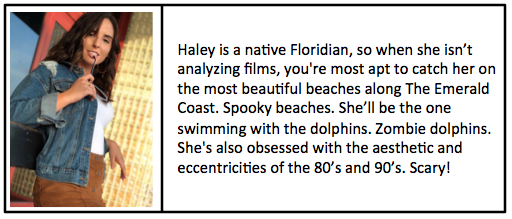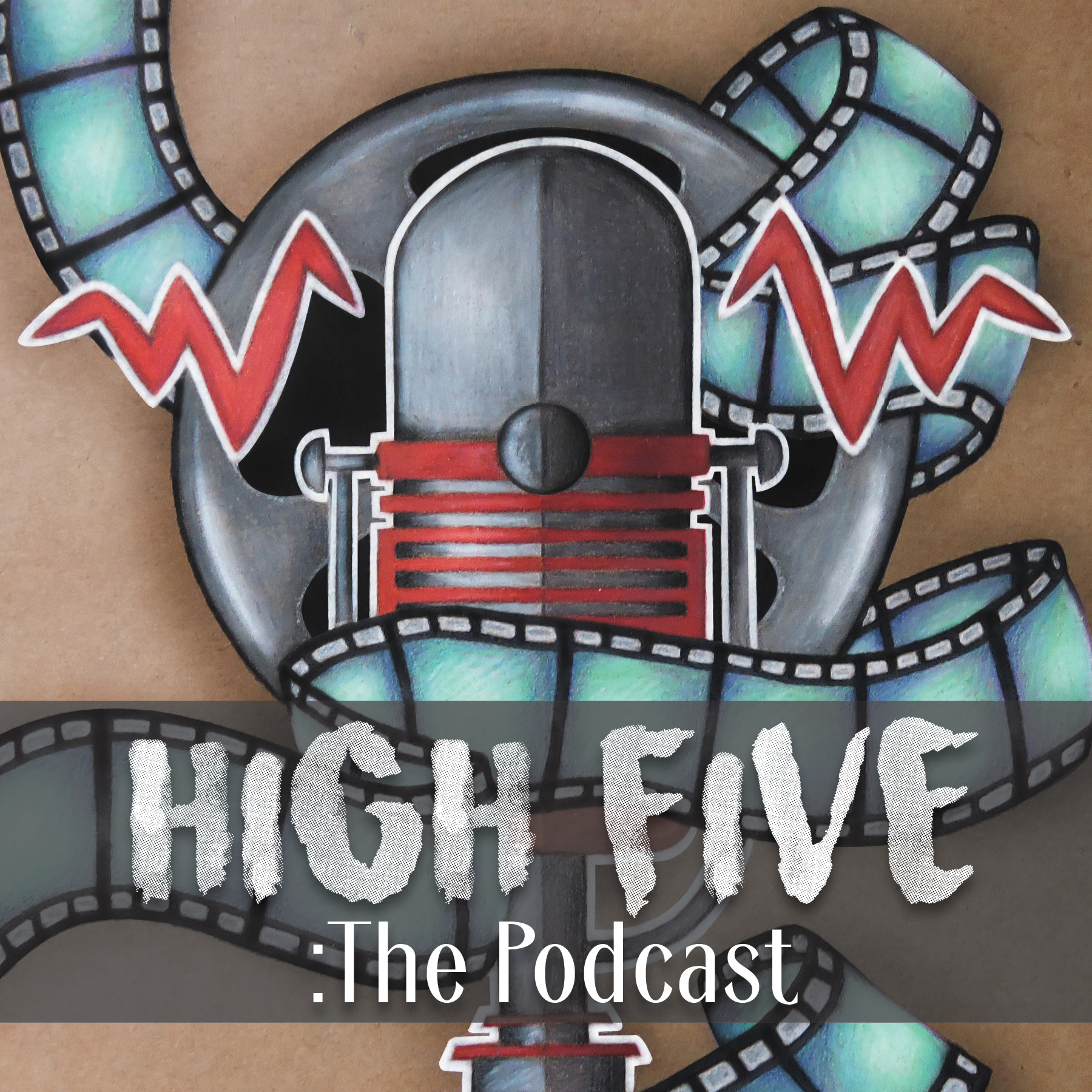Are you into horror films? Like, REALLY into horror films? We call bullshit. No one is more into horror than our mainline to the under-verse, Haley. She breaks down your favorite scary flicks better than you knew possible. Her keen eye catches the scene within the scene and gives her the skills to critique films so you lucky High Fivers can glean a deeper knowledge of the psychology that is unique to the horror genre. Welcome, to the Gates of Haley.
American Psycho: Is Patrick Bateman a Confused Narcissist or a Murderous Sociopath?
A lot of films and novels have contributed to my insatiable hunger for horror, gore, and anything that will make me cringe. While through the years as horror has progressed and flourished many different subgenres and birthed many iconic monsters and things that go  bump in the night, the idea of “random knife-wielding serial killer” has been touched on many times, often with no discussion-worthy storyline. American Psycho pushes the slasher genre into a whole new arena, involving identity crisis, self-loathing, and created realities. What is most interesting about this film, however, is that we never truly know if Bateman is the murderer that he himself claims to be. Is this a case of a man with a mental disorder struggling to make sense of his feelings and identity? Or is this simply just a sociopath trying to break free of the shallow lifeless society he lives in? I’m here to give you a quick breakdown.
bump in the night, the idea of “random knife-wielding serial killer” has been touched on many times, often with no discussion-worthy storyline. American Psycho pushes the slasher genre into a whole new arena, involving identity crisis, self-loathing, and created realities. What is most interesting about this film, however, is that we never truly know if Bateman is the murderer that he himself claims to be. Is this a case of a man with a mental disorder struggling to make sense of his feelings and identity? Or is this simply just a sociopath trying to break free of the shallow lifeless society he lives in? I’m here to give you a quick breakdown.
Patrick Bateman (Christian Bale) is introduced in the opening scene with his fellow businessman as a well-spoken, handsome, wealthy, egalitarian type individual. The type of guy you would love to have as a friend or partner. This is “the mask” that will be referenced later. Within the first three minutes of the movie, we already have an idea of what Bateman is like around his male friends, and people that would challenge his way of thinking.This plays a major role in understanding how, and why, he maneuvers the way he does throughout the film.
Bateman soon begins to show his true colors and we start noticing the signs of a concealed personality. This is where we first see Bateman speak “out of character.” This happens very often in the film and plays a crucial role in understanding the actions (or fantasies) of Mr. Bateman. As his tickets are turned down at a local bar and the waitress asks for cash, we see not a break in his face as he calmly states “You’re a fucking ugly bitch, I want to stab you to death, and then play  around in your blood.” A pretty intense reply for a simple “this is a cash bar only.” What happens here, and again often, the character in which Bateman is talking to seems to not understand, or even hear what he said. We begin to understand that our “American Psycho” is a master of disguise. As we progress to the infamous “getting ready” scene, we learn that Bateman says he “simply is not there,” even though his life seems like that of a dream: a beautiful apartment, a well-paying job, surrounded by beautiful women. Bateman is the embodiment of a successful man, yet everything seems to annoy and irritate him. Especially any type of relationship with a woman. The cookie cutter thoughts that others have seem to be something that Bateman wants no part of, yet yearns to have.
around in your blood.” A pretty intense reply for a simple “this is a cash bar only.” What happens here, and again often, the character in which Bateman is talking to seems to not understand, or even hear what he said. We begin to understand that our “American Psycho” is a master of disguise. As we progress to the infamous “getting ready” scene, we learn that Bateman says he “simply is not there,” even though his life seems like that of a dream: a beautiful apartment, a well-paying job, surrounded by beautiful women. Bateman is the embodiment of a successful man, yet everything seems to annoy and irritate him. Especially any type of relationship with a woman. The cookie cutter thoughts that others have seem to be something that Bateman wants no part of, yet yearns to have.
To truly decipher the true mental state Patrick Bateman is in, pay close attention to the events that occur in the business card scene that follows.
With Bateman’s own sanity and identity in a crisis, we also notice the other characters using names interchangeably, as if everyone has no meaning and is virtually unidentifiable, even though he thinks they are, which also can raise questions in whether or not Bateman committed the murders, or just imagined them. Bateman’s conversation also seems meaningless, as most of the characters don’t notice anything he is doing or saying. The music monologues are extremely important when analyzing this. Bateman clearly is very educated on music, but every time he talks about it, it’s to people that either don’t hear or seem to not understand, which only contributes to the crumbling of his own emotional wall (for example, Paul Allen, the prostitutes). The life Bateman is living for others is starting to crumble very fast.
As Bateman soon begins to spiral out of control, a bloodbath arises. Prostitutes, old women, a chainsaw chase and even dogs, we aren’t unaware that he is capable and ready to murder in even the most obvious of areas. The most interesting is the final scene, where the ATM demands that Bateman feed it a cat. Although the feelings welling inside Bateman are appearing to be almost cartoonish, this is the embodiment of all the rage he is feeling without any relief. With Paul Allen “gone”, Bateman is suddenly shown that it will not change anything, whether he really did murder him or not. Bateman is still the cookie cutter image of his coworkers. In an emotional confession to his lawyer, it is revealed that Paul Allen couldn’t have been murdered because the lawyer had just  had dinner with him earlier that week. With names being confused so many times in this movie, is the lawyer even really talking about the Paul Allen that Bateman killed, or is he confused with yet another businessman? While Bateman closes out the movie with another monologue, we learn that he has no remorse, no feelings, and will continue to feel the same way that he did before. His mask he mentioned earlier slipped, with no repercussions. Bateman had virtually designed himself a life where he is controlling everything. Whether that be a fantasy or real events, Patrick Bateman still remains the embodiment of an American Psycho.
had dinner with him earlier that week. With names being confused so many times in this movie, is the lawyer even really talking about the Paul Allen that Bateman killed, or is he confused with yet another businessman? While Bateman closes out the movie with another monologue, we learn that he has no remorse, no feelings, and will continue to feel the same way that he did before. His mask he mentioned earlier slipped, with no repercussions. Bateman had virtually designed himself a life where he is controlling everything. Whether that be a fantasy or real events, Patrick Bateman still remains the embodiment of an American Psycho.
In conclusion, I myself was having a hard time deciding whether or not I believe that Patrick Bateman committed these acts. I’ve diligently searched through every fan theory, review, and analysis I could find to rest my mind. I mean, I have to at least understand the ending of one of my favorites, right? It turns out, through this labor of research, that Bret Easton Ellis himself (the author of the novel “American Psycho”) is leaving the interpretation of the murders to the readers. After all that information, the ending is left to only me? I think my mask of sanity is about to slip.
About the Author (of Your Doom)








